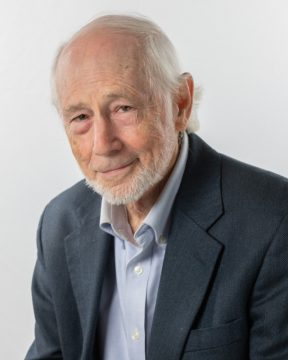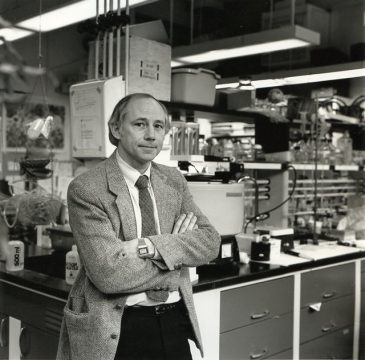Michael W. Fanger, PhD, professor emeritus, former chair of the Department of Microbiology and Immunology at Geisel School of Medicine, and entrepreneur died Tuesday, August 1. He was 83 years old.
Remembered by friends and colleagues for his entrepreneurial spirit, keen intelligence, and sense of humor, the immunology researcher and visionary began his career at Dartmouth in 1981 when he joined the medical school’s immunology program, building that program into a world-renowned Department of Microbiology and Immunology that he chaired for a decade.
"Mike's leadership helped to build the Department of Microbiology and Immunology at Geisel into a top department nationally, and he was a pioneer at Dartmouth in showing how scientific impact could be accelerated through commercialization,” says Duane A. Compton, PhD, Geisel dean.

David Leib, PhD, chair of microbiology and immunology, recalls Fanger as a generous and thoughtful man with a keen sense of humor.
“I spoke with Mike at length during my first interview at Dartmouth and his insight and intellect were hugely influential on my decision to join the department,” Leib says.
“Through the years, I’ve regularly sought his counsel—he was always generous with his time, gave outstanding advice, and had the uncanny ability to leaven serious discussions with his unique sense of humor. His academic legacy at Dartmouth, and in immunology and cancer therapy is unparalleled, but more than anything I’ll miss his vibrant, sage, and engaging presence in our hallways.”
Fanger made advances in immunotherapy long before it was considered a treatment option. He authored more than 160 publications and more than 90 patents and patent applications, spanning bispecific antibodies to cellular therapies.
In 1987, he and Paul Guyre, PhD, a fellow immunologist, and entrepreneur, founded Medarex—a biopharmaceutical company that developed monoclonal antibodies to the T cell checkpoint proteins CTLA-4 and PD-1. By blocking the checkpoint proteins, these antibodies enable T cells to attack and destroy cancer cells. Checkpoint proteins thus control and regulate immunity and the immune response.
Fanger collaborated with immunologist James Allison, PhD, who won the Nobel Prize in 2018 for identifying the immune checkpoint molecule CTLA-4, and with Tasuku Honjo, MD, PhD, who discovered a related immune target, PD-1, and shared the prize with Allison. His vision and collaboration with Allison and Honjo led to the development of the first FDA-approved immune checkpoint inhibitor drugs (ipilimumab and nivolumab) for cancer patients. These two drugs now have nearly 40 FDA approvals between them.
Unlike chemotherapy, which uses powerful drugs that can have painful, lasting side effects, immunotherapies engage the body’s immune system to battle cancer cells and are now the most promising method of treating cancer.
Now owned by Bristol-Meyers Squibb, these drugs give hope to previously incurable cancer patients and save thousands of lives. The 3-year survival rate for patients with advanced melanoma is now 58 percent; prior to 2014 it was as low as 20 percent.
Guyre, whose sense of humor matched Fanger’s, says, “Since Mike and I shared the relevant intellectual property, he twisted my arm to be a co-founder of Medarex. Now, thanks to his smart, thoughtful, and caring leadership, I too get credit for the Medarex antibodies that have added over 800,000 years to the lives of cancer patients.”
While Fanger’s leadership of both Medarex and the Department of Microbiology and Immunology has yielded uniquely successful and impactful outcomes, his roles as teacher, counselor, advisor, and mentor were equally influential.

Continuing in his footsteps, several Dartmouth investigators are leading the way in important immunology discoveries by either founding a company to further develop their discovery or working with a corporate partner to do so. One example is Randy Noelle, PhD, professor emeritus of microbiology and immunology and co-founder of ImmuNext, which develops immunotherapy compounds for treating cancer and autoimmune diseases, is embedded within Dartmouth Cancer Center.
The Cancer Center's Immunology and Cancer Immunotherapy Program spans seven departments at Geisel and Thayer School of Engineering, enabling investigators to move quickly in taking research from the lab to the clinic—a legacy initiated by Medarex.
Mary Jo Turk, PhD, co-director of the Immunology and Cancer Immunotherapy Program, says most people working in immuno-oncology are familiar with Fanger and Medarex.
“Mike was a dear friend and colleague—truly one of the kindest and most supportive individuals I have known.,” Turk says. “He cared primarily about the success and happiness of others and was an incredibly generous mentor of junior faculty.
“Of note, he was uniquely supportive of his female faculty colleagues—consistently elevating their careers and championing their accomplishments and successes. Mike’s support has been critical to my own success as a scientist and leader.
“In addition to building our immunology community, Mike demonstrated remarkable commitment to the teaching of undergraduate immunology at Dartmouth. He trained generations of biology students and cared deeply about them, showing the utmost care in supporting them through many needs and challenges. Beloved by his students, he was also a role model for his colleagues with whom he taught.”
William R. Green, PhD, professor emeritus of microbiology and immunology, fondly recalls his former colleague and mentor. “I’ve known Mike since 1973 when I was his graduate student at Case Western Reserve University. He was the consummate mentor, and because of that, a great leader who folks wanted to follow. Regardless of the situation and challenges, he found creative, opportunistic ways to make the best of the circumstances, often turning them into a win-win for everybody. He was tenacious and competitive—I’ll never forget his feisty play at our pickup basketball games either at the gym or in his home driveway.”
Noting her mentor’s sense of humor during the department’s holiday parties, where graduate students from various labs participated in lip sync competitions, Cheryl Guyre, DMS ’00 one of Fanger’s graduate students, says, “The year the Fanger-Shen labs collaborated in a rousing rendition of Jailhouse Rock with a choreographed dance routine, Mike came ‘on stage’ dressed as Elvis. The crowd went wild!
“In some years, we knew Mike would be participating, and in others he’d surprise us when he joined our routine while wearing an outrageous outfit,” Guyre recalls. “While most PIs stood back and watched their grad students, post docs, and staff make fools of themselves during these skits, Mike was brave enough to let his hair down and be part of the fray.”
In 2008, Fanger cofounded Celdara Medical, headquartered at the Dartmouth Regional Technology Center in Lebanon, NH, with Jake Reder, PhD, director of New Ventures at Geisel, to help investigators translate academic science innovations into medicines that improve human health.
“Mike and I founded Celdara to transform the work of leading scientists into products and services that can help humanity,” Reder says. “His impact on the biotech industry is the stuff of legend, but for the many of us whom he inspired, his teaching, mentoring and friendship may be even more impactful.”
Celdara opened The Fanger Center in 2021. It was built in collaboration with the New Hampshire Academy of Science and Crossroads Academy and provides an opportunity for middle- and high-school students from New Hampshire and Vermont to engage in authentic scientific research with teachers and STEM professionals through an apprenticeship model.
“Mike contributed immeasurably as an educator, both formally and informally, investing his time and talent in STEM leaders of the future. These virtues are a big part of why we honored his legacy with the Fanger Center. I hope that every student who passes through those doors learns something about Mike and realizes that they too can be great by doing good.”
Fanger’s friend and Geisel colleague Jane Collins says, “Mike was a dedicated leader, a passionate educator, and friend. Our lives were changed forever, for the better, because of him.”